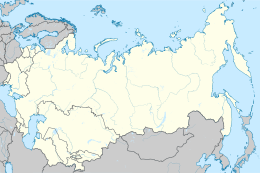Commons:Copyright rules by territory/Soviet Union/ja
|
著作権に関する諸規則: ソビエト連邦 ショートカット: COM:Soviet Union | |
 | |
 | |
| 保護期間 | |
|---|---|
| 標準 | 死後25年 |
| その他 | |
| 一般的なライセンスタグ |
{{PD-old-auto}} {{PD-RusEmpire}} {{PD-RU-exempt}} |
| 条約 | |
| 万国著作権条約 | 1973年5月27日 |
This page provides an overview of copyright rules of the former Soviet Union relevant to uploading works into Wikimedia Commons. Note that any work originating in the former Soviet Union must be in the public domain, or available under a free license, in both the country of origin and the United States before it can be uploaded to Wikimedia Commons. If there is any doubt about the copyright status of a work from the former Soviet Union, refer to the relevant laws for clarification.
背景
The Union of Soviet Socialist Republics (USSR), or Soviet Union, was a state that spanned large parts of eastern Europe and northern Asia that existed from 30 December 1922 to 26 December 1991. It succeeded the Russian Empire, and comprised 15 nominally independent republics.
Before 1 June 1973 the general term of protection was for the lifetime of the author plus 15 years after death. The Soviet Union joined the Universal Copyright Convention on 27 May 1973, and the term of protection was retroactively extended to life plus 25 years. This remained in effect until the USSR was dissolved.
後継の国等
In 1991 the Soviet Union was dissolved. 12 of the republics formed the Commonwealth of Independent States (CIS), and are the legal successors of the USSR. These are Armenia, Azerbaijan, Belarus, Georgia, Kazakhstan, Kyrgyzstan, Moldova, Russia, Tajikstan, Turkmenistan, Ukraine and Uzbekistan. The three Baltic republics, Estonia, Latvia and Lithuania took the position that they had been occupied countries rather than members of the USSR, and chose not to join the CIS.
Works published in the former USSR should be in the public domain under the laws of the successor country of origin and the United States if they are to be uploaded to Wikimedia Commons.
Note: There was a discussion whether pre-1973 works from the Soviet Union are copyright-free, originating in the period of uncertainty after the dissolution of the Soviet Union. It was concluded that this theory is incorrect; see discussions in Template talk:PD-Soviet.
コピーライト・タグ
- {{PD-RusEmpire}} 1917年よりも前に出版されたもの
- {{PD-RU-exempt}} 著作権の対象ではないもの
通貨
参照:Commons:通貨
OK ソ連の通貨は著作権で保護されていません。
{{PD-RU-exempt}}を使ってタグ付けしてください。
風景の自由(FOP)
Most of the successor nations of the Soviet Union have identical provisions on freedom of panorama and restrict it to non-commercial uses only. Refer to the pages describing the copyright rules for each member state for current rules.
切手
参照:Commons:切手
{{PD-RU-exempt|stamps}}を使ってタグ付けしてください。
Since, according to intergovernmental and international treaties, Russian Federation is a legal successor to the Russian Soviet Federative Socialist Republic and the Union of Soviet Socialist Republics, the tag {{PD-RU-exempt}} (please see "Russia" above) also applies to images of postage stamps, stamped covers and stamped post cards (postal stationery) of the RSFSR and USSR.
関連項目
- Союз Советских Социалистических Республик
- Category:Stamps of the Soviet Union
- COM:CRT/アルメニア
- COM:CRT/アゼルバイジャン
- COM:CRT/ベラルーシ
- COM:CRT/エストニア
- COM:CRT/ジョージア
- COM:CRT/カザフスタン
- COM:CRT/キルギス
- COM:CRT/ラトビア
- COM:CRT/リトアニア
- COM:CRT/モルドバ
- COM:CRT/ロシア
- COM:CRT/タジキスタン
- COM:CRT/トルクメニスタン
- COM:CRT/ウクライナ
- COM:CRT/ウズベキスタン
出典
- ↑ TACIS Retroactivity Report (Russia). Russian-Ukrainian Legal Group (11 April 2001). Retrieved on 2019-02-10.